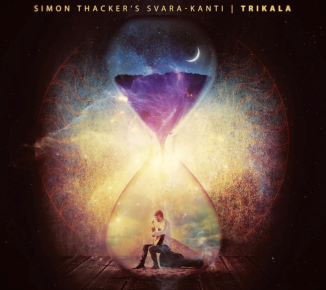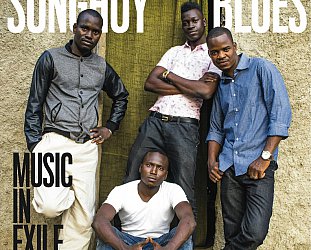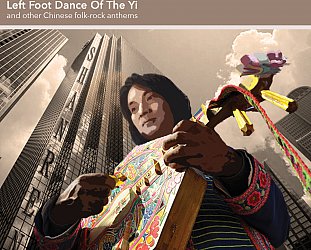Graham Reid | | 2 min read

Strange how a chance hearing of something can put you on a different path. When I was about 12 I joined the World Record Club which, if you didn't send a form back every month declining their offer, a record of their choice would arrive at your door . . . also with the bill.
By not getting the forms back on time I ended up with, among other things, a Manitas de Plata album and, much better, Ravi Shankar's Improvisations/Theme from Pather Panchali.
The latter was profoundly affecting and I have listened – off and on admittedly – to Indian classical music (and some folk) ever since.
Weird that a boy born in Scotland and living in New Zealand would hear something in Indian classical music which was profoundly affecting and, strange as it may seem, so familiar. It seemed like music I knew from before I was born.
Classical guitarist Simon Thacker – who we interviewed at length three years ago in advance of an Auckland concert – comes from rural East Lothian in Scotland and he too has an intimate connection with Indian music, much deeper of course than mine.
He has toured and recorded with Indian musicians and this double album was recorded over a period of three years (in Scotland, Chennai and Kolkata) with numerous Indian musicians and singers.
As he concedes in his thoughtful liner notes, the idea of cross-cultural collaborations of this kind are common and so there can be a certain weariness from audiences towards this kind of “fusion”. But Thacker's project is much deeper, complex and therefore rewarding than simply arc welding different styles together.
This music isn't diluted to get a desired but superficial effect, instead it distills down to deeper essences and ancient traditions.
That is not to say this collection is hard work to listen to although it does reward serious concentration.
But that isn't hard because at times the vocalists sweep and soar, the musicianship by all is impeccable and . . . damned if the traditional Punjabi folk song Chan Kithan Guzari Ayee Raat Ve, reimagined by Thacker and sung by Afsana Khan, doesn't sound like catchy pop hit.
Okay, that might sound like a slight and not taking this seriously, but the engaging charm of this collection is that it goes deep and wide but also keeps a remarkably tight focus in the 21 pieces which reach from that kind of vigorous interplay of vocals, guitar, violin and tabla to Thacker's more meditative pieces.
And his nine minute solo original Nirjanavana which utilises slight delay which he responds to an improvises around in real time. It may have its soul in India but it also alludes to other threads in his background, notably the Western classical guitar tradition. And some seriously disruptive playing in its closing overs.
The second disc here – the album title relates to the Sanskrit word representing past, present and future – reaches back to the Baul traditions of Bengal with vocalists Raju Das Baul and Farida Yesmin.
Tomra Kunjo Sajao Go with Raju is a joyously soulful piece (a vocal quality he brings also to Ekla Chalo Re from a poem by Tagore) with sometimes furious fretwork from Thacker paralleled by driving tabla.
Now, given the scope of what is here – about 140 minutes – and how long this has been in gestation before being brought to fruition, this is less a review than an introduction to this music.
The album comes with a 40 page book of lyrics in translation, biographies, explanations, history and images.
Of course it is not for everyone, but Simon Thacker is a rare musician who not only brings considerable skills and thoughtfulness but also sensitively allows the long heritage and Indian artists to command equal time.
Three years in the making.
Lifetimes in the result.
For more on this album and Simon Thacker see his website here.





post a comment